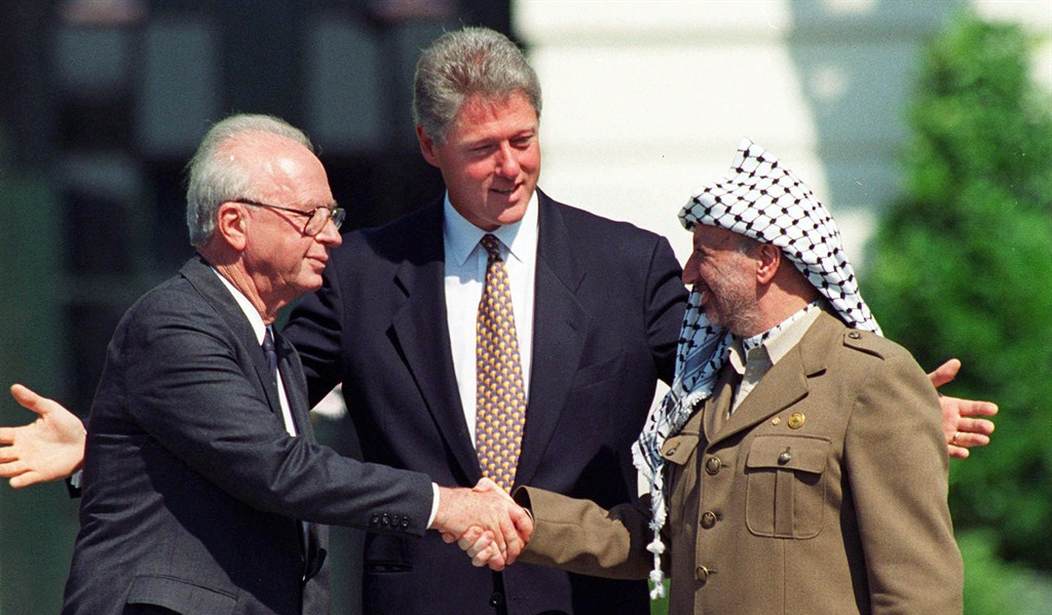Indian prime minister Narendra Modi's decision to visit Jerusalem but not Ramallah has prompted much comment.
The expectation of equal treatment goes back to the Oslo Accords' signing in Sep. 1993, when the prime minister of Israel, Yitzhak Rabin, represented his government in the handshake with Yasir Arafat, the much-despised chairman of the Palestine Liberation Organization. No one found it strange or inappropriate at the time but things look differently nearly a quarter century later.
It's now clear that Rabin's vanity got the better of him at that supremely high-profile event on the White House lawn. As the elected head of a democratic and sovereign government, he never should have consented to Arafat, the henchman of an unofficial, dictatorial, and murderous organization, enjoying equal status with himself.
Rather, he should have stayed aloof from him. Appearing together as equals created a dysfunctional illusion of equivalence that over subsequent decades became assumed, ingrained, and unquestioned. In fact, this false equivalence became even more inaccurate with time, as Israel went from one success to another and the Palestinian Authority brought on a reign of ever-deeper anarchy, dependency, and repression.
It's not just that Israelis stand among world leaders in science, technology, the humanities, and the arts, in military power and intelligence capabilities, not just that its economy is 25 times larger than the Palestinian one; in addition, Israel is ever more a land where the law rules for all (at one point recently, a disgraced president and a criminal prime minister were simultaneously sitting in prison) and individual rights are not just promised but delivered. Meanwhile, the head of the Palestinian Authority, presently in the twelfth year of his four-year term, has been neither able to prevent creeping anarchy on the West Bank nor a rogue group from taking over in Gaza, one-half of his putative domain.
Recommended
Some would defend Rabin's self-imposed humiliation by arguing that he sought to strengthen Arafat and the PLO through pomp and pageantry. If this was indeed the plan, it backfired spectacularly. Rather than use the prestige of the Oslo signing ceremony to build a constituency that accepted the Jewish state and thereby end the Palestinians' conflict with it, Arafat exploited his heightened standing to develop new resources to reject Zionism and attack Israel. Palestinian "embassies" popped up worldwide to delegitimize Israel, while Palestinians killed more Israelis in the five years after the Oslo signing than in the fifteen years before it. In other words, Rabin recklessly put faith in a historic and barbaric enemy changing not just tactics but goals. Israel has paid a heavy price for this error.
Instead of the prime minister, the Israeli standing with Arafat on the White House lawn should have been someone like the second secretary at the Israeli embassy in Norway. That would have delivered the necessary signal that Arafat's protocol equivalent registers stoopingly low in the diplomatic hierarchy. To be sure, that would have meant no Nobel Peace Prize for Yitzhak Rabin. In retrospect, however, would it not have been better to skip celebrating so exuberantly a flawed, doomed, and destructive agreement?
For good measure, the signing ceremony should have taken place in the modesty of Oslo, not the grandeur of Washington, the imperial capital, the home town of the only hyper-power.
Had a lowly precedent been set in 1993, today's false parity between Binyamin Netanyahu and Mahmoud Abbas would not exist; the true imbalance of the Palestinian-Israeli relationship might be more clearly seen. As low-level diplomats, not prime ministers, negotiate with Arafat, Abbas, and the assorted other villains and self-styled Palestinian leaders, the world would be constantly reminded not of a sham parallel but of the vast moral and power gulf dividing the two sides.
Well, that did not happen. But is it too late? Can Netanyahu or a future Israeli prime minister escape the indignity of meeting as equals with the leader of a gangster enterprise?
No, it's not too late. Netanyahu could eloquently explain that he meets his legitimate counterparts; he will leave it to functionaries in the Foreign Ministry to handle whoever the Palestinian Authority throws up.
Imagine the benefits of such a step: Israel would gain in stature while the fetid nature of the PA would be exposed. American presidents would lose interest in the "ultimate deal." Other assorted would-be mediators and do-gooders would have a much harder time trying to revive a quarter century of botched negotiations.
So, I suggest Israeli prime ministers leave "peace-processing" with Palestinian hooligans to low-ranking staff.

























Join the conversation as a VIP Member